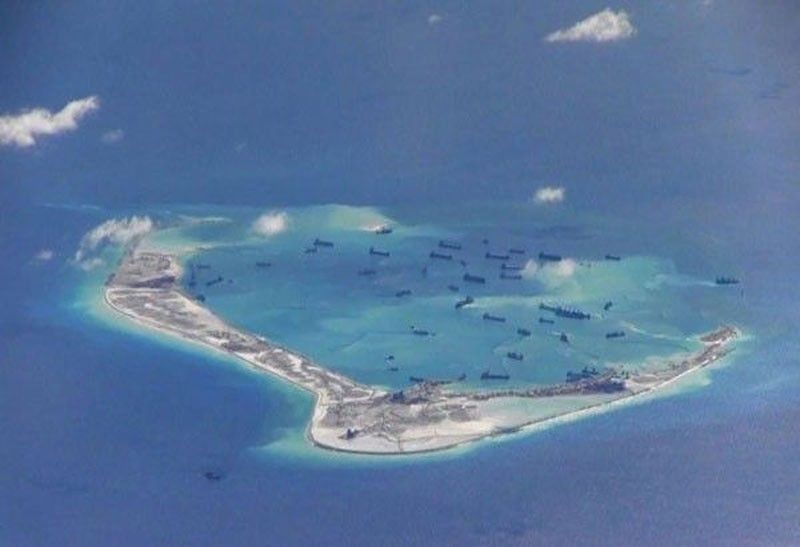US to China: Cease harassment in South China Sea

MANILA, Philippines — In marking the seventh anniversary of the South China Sea ruling on July 12, the United States urged China to follow international law and stop harassing vessels of claimant states operating in their exclusive economic zones (EEZ).
An arbitral tribunal constituted under the 1982 Law of the Sea Convention rejected China’s expansive claims in the South China Sea, including areas determined by the tribunal to be part of the Philippines’ EEZ and continental shelf and resources.
“Under the terms of the Convention, this ruling is final and legally binding on the Philippines and the PRC (People’s Republic of China),” US State Department spokesman Matthew Miller declared on the anniversary of the South China Sea arbitral ruling.
The US reaffirmed its July 13, 2020 policy regarding maritime claims in the South China Sea.
“We continue to urge Beijing to comport its maritime claims with international law as reflected in the 1982 Law of the Sea Convention; cease its routine harassment of claimant state vessels lawfully operating in their respective exclusive economic zones; halt its disruption to states’ sovereign rights to explore, exploit, conserve and manage natural resources and end its interference with the freedoms of navigation and overflight of states lawfully operating in the region,” Miller said in a statement.
With the increase in Chinese coercion and dangerous operations in the South China Sea, the US underscored it is deeply committed to alliance obligations with the Philippines.
The Mutual Defense Treaty (MDT) between the US and the Philippines, signed in 1951, remains the bedrock of cooperation, it said, repeatedly giving assurance that the treaty applies to armed attacks on either of the two countries’ armed forces, or public vessels or aircraft anywhere in the South China Sea.
“We will continue working with allies and partners to advance a free and open Indo-Pacific, one that is at peace and grounded in respect for international law,” Miller said.
During the administration of the late former president Benigno Aquino III, the Philippine government filed an arbitration case against China in The Hague to challenge Beijing’s expansive and excessive claims in the South China Sea.
The late foreign affairs secretary Albert del Rosario led the Philippines’ winning arbitration case against China.
In a landmark ruling on July 12, 2016, the Hague-based Permanent Court of Arbitration (PCA) found no legal basis for China to claim historic rights to a nine-dash line in the South China Sea and Beijing had breached the sovereign rights of the Philippines.
But shortly after the successful outcome, then president Rodrigo Duterte decided to shelve the ruling for fear of displeasing Beijing.
China continues to oppose and refuses to honor the arbitral tribunal ruling.
US Ambassador MaryKay Carlson underscored that the Philippines secured a legally binding decision with the 2016 Arbitral Ruling that validates Philippine sovereign rights/jurisdiction over its EEZ and continental shelf and ruling that China’s maritime claims and actions to enforce those claims were inconsistent with international law.
“We applaud the tribunal’s decision rejecting the PRC’s putative claim to so-called historic rights in the South China Sea/West Philippine Sea,” Carlson said in her remarks about the US policy in the South China during a forum hosted by Stratbase ADR Institute.
The US maritime capacity-building programs, she said, provide countries with maritime domain awareness and the ability to patrol their claims to further promote peace and stability.
In the observance of the seventh anniversary of the ruling, Japan reiterated that the Award is final and legally binding on the Philippines and China, the parties to this case, and both are required to comply with the award.
“The claim by China that it will not accept the award is against the principle of peaceful settlement of disputes in accordance with international law, in particular UNCLOS (United Nations Convention on the Law of the Sea), and undermines the rule of law as a fundamental value of the international community,” Japanese Foreign Minister Yoshimasa Hayashi said in a statement.
He said that upholding and reinforcing the free and open international order based on the rule of law will be the benefit of all countries, large and small.
The minister said Japan highly appreciates the Philippine government for having consistently complied with the award and shown its commitment to the peaceful settlement of disputes in the South China Sea.
Japan renewed its objection to maritime claims in the South China Sea that are “inconsistent with UNCLOS and remains seriously concerned about the current situation.”
Tokyo reiterated its strong opposition to unilateral attempts to change the status quo by force or coercion.
Foreign Affairs Secretary Enrique Manalo said the Award on the South China Sea arbitration is an affirmation of the UNCLOS and its dispute settlement mechanisms.
“Anniversaries are markers reminding us of the trajectory we have taken as a nation and as a people. In the decision to file a case for arbitration, the Philippines opted to take the path of principle, the rule of law and the peaceful settlement of disputes. The Tribunal’s decision affirmed the correctness of that course of action,” Manalo said in a statement.
The Department of Foreign Affairs (DFA) launched yesterday a “microsite” providing a central resource containing official information and positions documenting the Philippines’ victory against China before the PCA.
The microsite provides links to resources including the material submitted to the Tribunal and made available by the PCA, DFA statements on the South China Sea Arbitration; legal and geographic scope of the West Philippine Sea as well as answers to frequently asked questions.
Support
The Armed Forces of the Philippines (AFP) was heartened by the growing international support for the 2016 decision that rejected China’s vast maritime claims in the South China Sea.
Seven years after the historical ruling, the military said it is doing more to help secure Philippine waters inside its EEZ despite the continuing unauthorized presence of Chinese military and civilian vessels in the West Philippine Sea.
Vice Admiral Alberto Carlos, commander of the AFP’s Western Command (WesCom), said the 2016 PCA ruling “gave credence and validation to Philippine sovereignty, sovereign rights and entitlements in the West Philippine Sea.”
“We are heartened by the solid fact that the decision is now part of international law, is recognized by the international community and has become the basis for policies and actions in the WPS,” he said in a statement issued July 12.
Meanwhile, senators said more should be done to fight China’s aggressive actions on the West Philippine Sea.
Sen. Risa Hontiveros said July 12 should be declared “National West Philippine Sea Victory Day” to commemorate the country’s win at the arbitral court even as China coast guard vessels and militia continue to harass Philippine vessels and fisherfolk.
For Sen. Jinggoy Estrada, the Philippines should not waver in fighting for the rights of fisherfolk and uniformed personnel guarding the waters but facing harassment from Chinese vessels.
During the Kapihan sa Senado forum, Sen. Grace Poe said she supported the resolution of Hontiveros urging the Philippine government to seek support from the international community by bringing the case before the United Nations General Assembly.
According to former Supreme Court associate justice Francis Jardeleza, who was solicitor general when the Philippines won arbitration, another case can be filed before an ad hoc tribunal constituted under the UNCLOS.
Jardeleza suggested that the case should be managed solely by the Office of the Solicitor General “without the heavy cost of hiring foreign counsel.”
“Essentially, litigation options would be the better way for the country,” he said, adding that while elevating the case to the UN has its advantages, the Philippines “has to contend with the veto power of China.”
Meanwhile, militant fishers’ group Pambansang Lakas ng Kilusang Mamamalakaya ng Pilipinas (Pamalakaya) chided President Marcos for his lack of action in stopping China’s encroachment of the country’s territorial waters.
Members of the group held a rally in Bicol on July 12 in commemoration of the seventh year of the ruling.
Pamalakaya chairman Fernando Hicap said they are frustrated and disappointed with Marcos for not asserting the country’s territorial?claims in the WPS.
“We have all the legal, political and historical grounds to assert our national sovereignty. Even the international court has ruled that China is at fault for its plundering of our environment through massive reclamation and large-scale fishing in our seas,” he said in a statement.?According to Hicap, fishermen have suffered a 70 percent loss in income for every fishing trip since China intensified its presence at Panatag (Scarborough) Shoal in Zambales during the Duterte administration. — Marc Jayson Cayabyab, Daphne Galvez, Emmanuel Tupas
- Latest
- Trending






























